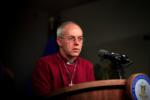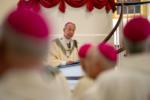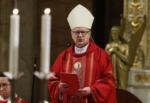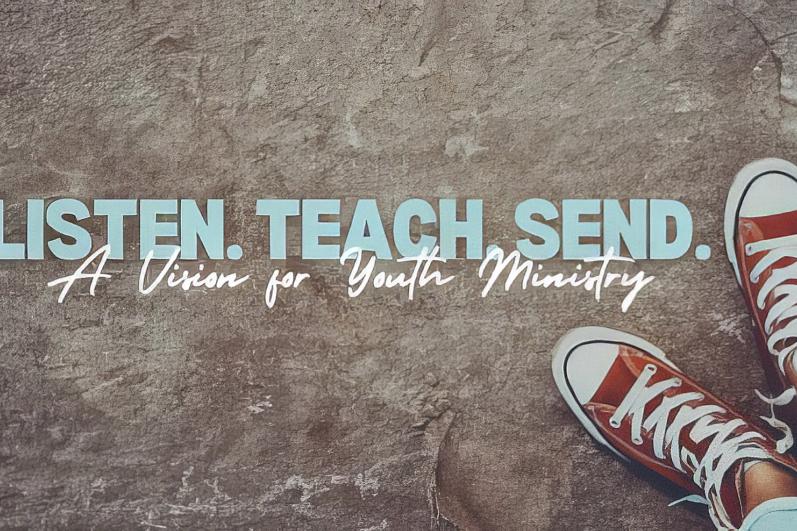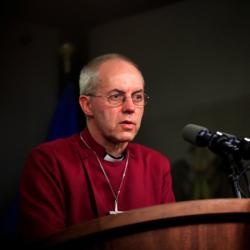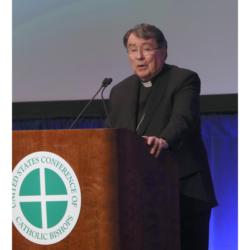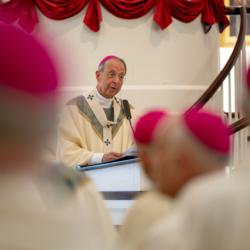Archdiocese launching new youth ministry initiative
BRAINTREE -- "Skibidi is complicated," says Patrick Krisak, director of faith formation and missionary discipleship for the Archdiocese of Boston.
"Skibidi" is a slang term from a series of viral online videos popular among middle schoolers. During archdiocesan youth ministry trainings, Krisak and others often discuss the ways that today's youth communicate with each other.
"I feel like I've just gotten a handle on some of the Gen Z slang," Krisak told The Pilot in an Aug. 23 interview. "A lie is 'cap,' gossip is 'tea.' Kids will say things, and we're like, 'We're not sure what you just said.' And if you have a good relationship, you can ask them to explain it to you."
For years, media and marketers have focused on teenagers in "Gen Z." Now, the members of Gen Z are graduating from college and joining the workforce. Children currently in middle school and starting high school -- the group impacted by Cardinal Seán P. O'Malley's decision earlier this year to lower the archdiocese's confirmation age from 10th grade to eighth grade -- are part of a new cohort: "Gen Alpha."
"With every new generation, there's new slang, new ways of viewing the world, and that requires a response from the church to meet people where they are in a new way," Krisak said. "To share the message of faith, the Gospel of Christ, in a way they can understand and connect to."
Starting in the fall, the Archdiocese of Boston plans to roll out a series of youth ministry training initiatives for clergy and laity, partnering with national organizations, including Andrew Ministries, LifeTeen, NET Ministries, Newman Ministry, Ydisciple, and Young Life. Those partner organizations will also help to provide youth ministry training to parishes for at least a year, for free or at a reduced rate.
"We're responding to the needs that parishes identify," Krisak said. "They would like more robust support for youth ministry, and that's because of the confirmation age change, that's because of the changing landscape of staffing parishes post-COVID, that's because of changes in youth culture today."
The training will begin with a session for priests and bishops at the Archdiocese of Boston Pastoral Center in Braintree on Sept. 11 at 7 p.m. After that, there will be a series of sessions to discuss the future of youth ministry, and monthly youth ministry trainings via Zoom. Topics addressed by the trainings will include "Generation Alpha and Differences Between Middle Schoolers and High Schoolers," "Recruiting Adults for Youth Ministry," and "Navigating Hot Button Issues."
"We want them to stay in our parishes," Bishop Cristiano Barbosa, the Archdiocese of Boston cabinet secretary for evangelization and discipleship, told The Pilot in an Aug. 29 interview. "We want to offer them reasons to stay, creating more space for them to have community, participate more in the life of the parish, to understand that they are part of a broad mission of the church."
Bishop Barbosa said that lowering the age of confirmation creates a need to "offer something for these kids."
"We have a longer gap between the end of teenagerhood and the beginning of young adult life," he said. "The more things that a parish, a pastor, could offer for this growing number of teenagers of youth that we are going to have in our parishes, the better."
However, he said, many parishes lack volunteers to do that.
"We want them to feel more energized, empowered to understand what they can do," he said. "They can begin to do something, or at least try, in those places where nothing is being done."
The upcoming training is the start of a long-term vision for the archdiocese. It is based on "Listen, Teach, Send," a framework for youth ministry promulgated by the U.S. Conference of Catholic Bishops in June. Krisak described the framework as an "accompaniment model" of youth ministry, which addresses young people's human, intellectual, spiritual, and pastoral needs.
"Listening to their story, teaching them, inviting them to a relationship with Christ, and then sending them out," he said.
Bishop Barbosa said that young people in parishes need the same resources as any other parishioner. They need to feel like they belong to the parish and that the parish belongs to them.
"They are the future of the church, and we need them, and they need the church," he said. "They need to feel that the church is their home and their community, helping them navigate the difficult times."
Krisak follows middle school and high school teachers on TikTok to learn about what Gen Alpha is going through. From them, Krisak has heard that young people are having trouble with in-person social interaction. Due to the isolation they faced during the COVID-19 pandemic, such interaction doesn't come naturally to them.
"One of the things that is a challenge for them is COVID," Krisak said. "That period of time where everybody was at home and they were not together and socializing in school the way that everyone had been up until that point. I don't think we know quite what impact that had."
He has found that the age of disaffiliation from the Catholic Church is getting lower and lower.
"Part of it has to do with the rise of social media," he said. "It's wonderful that social media allows so many more of us to be more connected in so many ways. At the same time, a lot of people think it contributes to the anxiety and mental health issues we see among young people."
As young people are figuring out their identities and values, he said, social media creates "a huge challenge." In that challenge, he sees an opportunity for the church to provide the connectedness and community that young people are craving.
"At a time where people are cynical and disconnected and not believing in institutions, and they don't know where to turn and who to trust, we can provide some hope for them," he said.
He described the purpose of the upcoming trainings as teaching people to see youth ministry in a whole new way. A parish doesn't need a full-time youth minister, he said, as "wonderful" as that would be. He believes that any adult at any time can be a youth minister.
"There is a problem here that young people feel disconnected and are not engaged in the life of the faith, but the solutions are not as complicated and expensive as people think," he said.
When most people think of youth ministry, Krisak said, they think of "fun and games" and activities like pizza parties. He explained that while those events are certainly a part of youth ministry, it's far from everything that it has to offer.
Speaking to The Pilot on Aug. 28, Archdiocese of Boston Evangelization Consultant Chris Donoghue said that, contrary to popular belief, a youth minister doesn't have to be "young and hip and cool."
"We've seen very effective youth ministry done with older people, grandparent-aged people who were just loving kids and involved in their lives and offering to accompany them and be with them," he said.
Evangelization Consultant Rosemary Maffei added, "You don't have to be close to their age or speak their language to show that you care about them. Everyone desires to be seen, heard, known, and loved, and we maybe have more of that inside of us to be able to do that than we recognize."
Krisak said that youth ministers shouldn't pretend to be young people. They have to find a balance between understanding and respecting the culture of the new generation while not coming across as condescending or pandering.
"We don't want people to be inauthentic or not be themselves, or behave a certain way because they're around certain people," he said.
When it comes to "Listen, Teach, Send," Donoghue said, adults in parishes "want to naturally jump into the teaching and the sending," but forget to listen.
"They want to have classes and teach, make sure kids know certain doctrines or certain prayers, and then give them jobs to do in the church, and sometimes we do that without a context," he said. "It doesn't take root because it's not relevant to our lives. Kids will do what adults tell them to do. But in their relationship, is something growing deeper there?"
"I would say that our real focus is actually accompanying the adult disciples who accompany the youth, and equipping, forming them to then walk alongside the youth to have an encounter with Christ," Maffei said.
She said that while planning the trainings, the archdiocese and its partner organizations prayed the rosary and read Scripture together over Zoom.
"It has to be rooted in prayer," she said.
Donoghue pointed out that the day The Pilot spoke to him and Maffei, Aug. 28, was the feast of St. Augustine, and that the feast of St. Monica was Aug. 27.
"There's that beautiful story of Monica praying for her son and bringing him to the faith through her prayers," he said. "We know the power of prayer, of parents and other adults praying for children, praying for young people. They need it, and we need to be doing it."
More information on the archdiocese's youth ministry initiative is available at bit.ly/RCABym.



